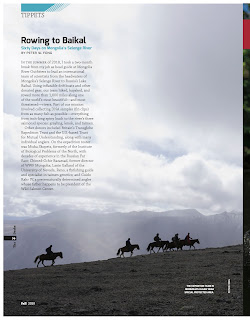In April 2025, I joined Mike Fay, leader of the legendary MegaTransect, on an exploratory trip to South Sudan’s Nimule National Park and its associated buffer zone, to assess fish populations—especially Lates niloticus—in the Nile River. What we found was both heartening and frightening: it’s a profoundly fragile place, scarred by war, and yet a fount of undeniable abundance.
In August, Mike and I joined two more friends in Mongolia’s Altai Tavan Bogd National Park to collect data on two relatively little-studied fish: the Altai osman (Oreoleuciscus potanini) and the Mongolian grayling (Thymallus brevirostris). According to one recent study, vehicle entries in the park rose from 719 to 13,192 between 2018 and 2024, an astonishing increase of more than 1750 percent. While existing populations of osman and grayling now seem adequate to attract and entertain visiting anglers—the combination of scant historical data and a limited understanding of their life histories and ecology renders both species vulnerable to decline.
I’ll write more about those trips and those fish soon. (For the record, the Nile perch was so integral to ancient Egyptian culture that it had its own hieroglyph, while sight-casting to osman cruising in shallow water is equally as addictive as chasing bonefish on a tropical flat.) In the meantime, you can find my “Confessions of a Poacher” in Issue 17.2 of The Flyfish Journal.
And an account of my shambolic history as a runner in the Fall Classics 2025 issue of Sport Literate (also, by coincidence, number 17.2).






















